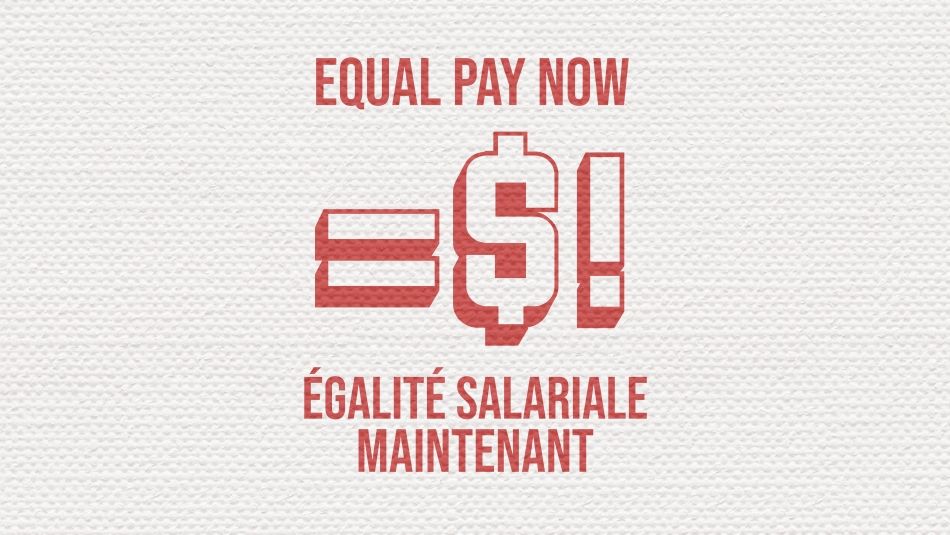
Share
On April 16, 2024 we mark Equal Pay Day which is a stark reminder of the ongoing fight for gender equality in the workplace in Canada and a call to rethink how we value labour as a society.
Equal Pay Day symbolizes the average additional time it takes for women in our country to earn what men did in the previous year, highlighting the persistent gender wage gap. For many women it may take even longer to achieve equal pay.
Facts reveal the undeniable reality of the gender wage gap and its impact on women's economic security. In Canada, women earn approximately 68 cents for every dollar earned by men, with even wider gaps for Indigenous and Black women at 58 cents, and women with disabilities at 57 cents. This gap not only affects individual women but also has deep implications for families and communities, where cycles of inequality and poverty persist.
Equal Pay Day is a day rooted in action and advocacy as we strive to dismantle barriers that continue to allow employers to pay women less.
Today is also the Federal Budget day and equal pay is a pillar of feminist fiscal policy that is long overdue to level the playing field.
Whenever the issue of the persistent gender wage gap is mentioned, there are a ton of myths that inevitably surface. This misinformation is being used to slow progress and must be challenged.
One such myth is that the gender wage gap exists because women choose lower paying jobs. No one chooses to have their work undervalued and underpaid. This should go without saying. One of the primary causes of the gender pay gap is that jobs that are traditionally associated with ‘women’s work’ are underpaid. Think of any job in the ‘caring industry’ such as nurses, midwives, and long-term care workers. It isn’t that women choose jobs that are in lower-paid industries, it is that women-dominated industries become less respected and less well-paid occupations because women do the work.
Another misconception is that the pay gap only exists because women are bad at negotiating pay. Let’s be clear, it is not an individual woman’s responsibility to ensure that her human rights are being upheld. It is the responsibility of government and employers to do so, which is why Unifor and other organizations are fighting for pay transparency legislation.
Pay transparency legislation plays a crucial role in addressing wage disparities by promoting accountability and empowering workers to advocate for fair compensation. By requiring employers to disclose salary information, these laws enable employees to identify and challenge discriminatory pay practices.
Unifor calls on every province and territory to implement comprehensive pay transparency legislation.
However, pay transparency alone is not enough to achieve true pay equity. We must also address systemic inequalities rooted in discriminatory practices and biases. Pay equity legislation aims to eliminate gender-based wage disparities by ensuring that women receive equal pay for work of equal value. By evaluating and comparing jobs based on skill, effort, responsibility, and working conditions rather than job titles, pay equity legislation promotes fairness and inclusivity in compensation practices.
Today, Unifor also calls on bargaining committees to be aware of negotiated Letters Of Understanding’s that state: “Parties agree that your workplace is Pay Equity Compliant and have met their legal obligations under the Pay Equity Act”. This language has a negative impact to the maintenance phase and retro payments that would be owed to women in the bargaining unit. Removing all barriers in collective agreements is one way to ensure Pay Equity is fully achieved for women.
One of the greatest equalizers to this injustice is women who belong to a union. Collective agreements lay out wage scales and are transparent for all members. Unions benefit women. Unifor is proud to be a union where women can thrive and grow without the many barriers faced by women in non-unionized workplaces.
Unifor supports the work of the Equal Pay Coalition and other groups organizing to make pay equity a reality. In solidarity, we also ask that you wear red and take a picture to share with the union, helping us show our collective support for pay transparency and the removal of all barriers to pay equity.
As we observe Equal Pay Day, let us reaffirm our commitment to gender equality and economic justice. Through collective action, advocacy, and solidarity, we can challenge stereotypes, dismantle barriers, and create workplaces where every worker is valued and compensated fairly. Together, we can build a future where women are paid equally to men in the same job providing us all with a more just and equitable society.
Email @email if you have any questions or concerns about how to ensure your workplace is free of a gender wage gap or if you need assistance with pay equity initiatives. Please email us your pictures and videos showing solidarity on Equal Pay Day.


